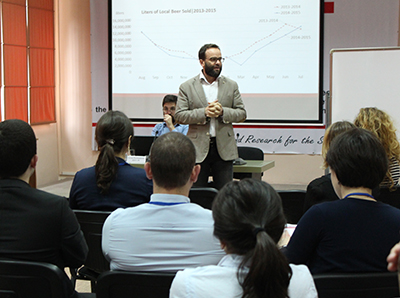Leaders in Development - ISET and JTI Launch a New Training Course
- Details

ISET Policy Institute in cooperation with Japan Tabacco International (JTI) Georgia launched a free-of-charge training program “Leaders in Development” for policy makers, analysts, mid-level and executives. Opening session held on May 24th, welcomed the first cohort of 31 senior professionals and decision makers coming from more than 15 public, private and non-profit organizations, including: The Ministry of Economy and Sustainable Development and the Ministry of Education of Georgia, Tbilisi City Hall, JSC Procredit Bank Georgia, JSC MFO Swiss Capital, Transparency International Georgia and Konrad Adenauer Foundation South Caucasus.
10 week long training program is structured around the most important elements of economic understanding. The program covers how markets work in an open economy, how businesses succeed and fail, why should we worry about inflation, external disbalances, unemployment, what hinders economic growth, how to justify policy decisions (especially in situations where no answer is objectively correct), etc.
The El Niño Southern Oscillation and Economic Growth
- Details

On Tuesday May 24, Dr. David Ubilava from the University of Sidney gave a presentation entitled "The El Niño Southern Oscillation and Economic Growth”. Dr. Ubilava started the presentation with the definitions of such phenomena such as climate anomalies and weather and emphasized the importance of weather as a factor in agricultural production. He then explained the term El Niño Southern Oscillation (ENSO), referring to the cyclical occurrence of unusually warm ocean temperatures in the tropical Pacific, which affects climatic conditions around the globe and influences primary commodity production and food prices.
The study focuses on the 72 developing countries and applies two distinct measures of the ENSO cycle. Using regression modelling framework and annual data spanning the 1971–2013 period, this research investigates the effect of ENSO anomalies on economic growth in the countries of interest.










